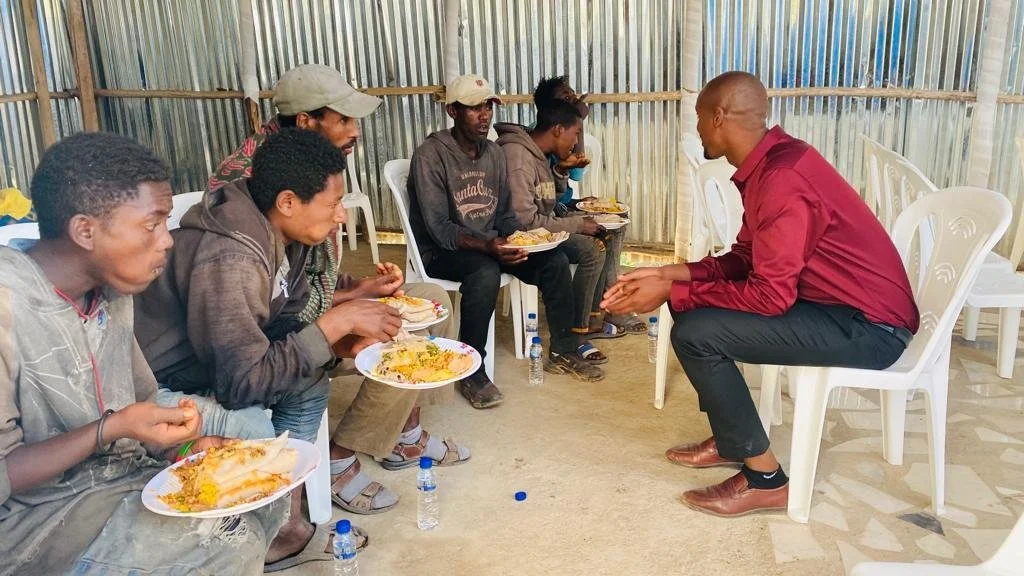Four Key Relationships: A Framework for Christlike Living (2)
Having laid the foundation of the UP and IN relationships, we now turn to the outward movement of Christlike love: mission to the unbelieving world. Jesus did not come merely to gather a community for itself, but to send that community out as a light to the nations. Our OUT relationship invites us to step beyond our comfort zones, embodying God’s compassion and proclaiming His good news to those who are still far from Him. Let us now consider how Jesus models this outward flow of love and how we are called to participate in His redemptive mission.
The OUT Relationship with the Unbelieving World: Mission
While Scripture speaks of the special love and unity among those in Christ’s Body, believers are also called to love those who do not yet know and follow Christ. We are not to be an insular, isolated community but one that reaches outward in loving mission to the world. Just as our Father God loved the world and gave His Son for its salvation (John 3:16), so too are we called to love and give ourselves for those who do not know Him and who are estranged and lost without Him. In His great grace for sinners, God is engaged in a mission that will one day bring representatives from every family and people group into His eternal family—gathered around His throne in diverse yet fully harmonious worship of Him and the Lamb (Rev 7:9). God invites His people to participate in this redemptive mission, proclaiming and manifesting His loving will that “none should perish” (2 Peter 3:9) in both words and deeds.
As with the UP and IN relationships, Jesus perfectly exemplifies the loving OUT relationship we are meant to have. In the same passage in Luke that we have been considering, Jesus’ solitary all-night prayers and His calling of disciples into an intimate community are immediately followed by His holistic ministry to a “great multitude” (Luke 6:17-19). This ministry to the crowd is the natural outpouring of the love He receives from His Father. He proclaims the kingdom (see Luke 6:20-23 and Matthew 5-7) and demonstrates it by delivering and healing all who come to Him. He is the Good Shepherd, willing to lay down His life so that lost “sheep” may come home to His fold and thereby know His Father (John 10:11; 14:6). In Jesus’ earthly life, we see a balanced rhythm and flow of love relationships—from the upward relationship with the Father, to the inward community with His disciples, and finally, together with his disciples, to the outward mission to those who do not yet believe in Him.
“The Great Commission is not an option to be considered; it is a command to be obeyed.”
Hudson Taylor
Again, Jesus invites us into this life of loving, holistic mission to the world. Indeed, He commands and commissions us into it. As an expression of the Great Commandment to love God and our neighbor (Matt 22:36-40), He concludes His earthly ministry with the Great Commission—to go into all the world as His Spirit-empowered witnesses, making disciples of all nations (Matt 28:18-20; Luke 24:47-49; Mark 16:15-18; Acts 1:8). John expresses this Christ-shaped mission in Jesus’ powerful declaration: “As the Father has sent me, even so I send you” (John 20:21). As Hudson Taylor said, “The Great Commission is not an option to be considered; it is a command to be obeyed.” We obey not out of mere obligation but as an expression of our love for God (John 14:12) and Christ’s love for the people of the world for whom He died (2 Cor 5:14-15).
The DOWN Relationship over Evil: Warfare
Finally, we consider the fourth relationship: the downward relationship of our authority over evil. Unlike the other three, this is clearly not a love relationship, but one of confrontation and warfare. We cannot be neutral or expect “peaceful coexistence” with evil. As C.S. Lewis states, “There is no neutral ground in the universe: every square inch, every split second, is claimed by God and counterclaimed by Satan.” We ignore this reality to our peril. Our battle is not only against the devil and his minions but also against the flesh—our sinful nature—and the fallen world system. As John Eldredge teaches in The Sacred Romance, we are caught up in an epic love story, but it is “a love story in the midst of a war.”
“There is no neutral ground in the universe: every square inch, every split second, is claimed by God and counterclaimed by Satan.”
C.S. Lewis
In God’s great redemptive work, He confronts and overcomes evil in all its dimensions. Above all, He defeats sin, death, and the devil through the cross and resurrection. We are not merely passive recipients of God’s saving work. Rather, an essential part of redemption is the restoration of the authority over evil that was given to the first humans in Eden but later forfeited. Jesus Christ, the God-man, restores that authority and, in large measure, shares it with His disciples.
Before we discuss the believer’s authority further, we must again look back at the example of the incarnate Jesus. Returning to the Luke 6 passage we have been considering, we see that Jesus demonstrates the kingdom among the lost crowd by healing and delivering them (6:18-19). In this holistic mission, He demonstrates victory over the evil that had brought destruction to their lives, bodies, and relationships. Jesus always taught and ministered with authority, most vividly displayed in His deliverance of people from demonic oppression and possession. As He later states in Luke, “If it is by the finger of God that I cast out demons, then the kingdom of God has come upon you” (11:20). Jesus’ ministry, culminating in His death and resurrection, was one long and victorious confrontation with evil—not only freeing the demonized but also proclaiming truth against lies and calling out unjust (and demonically influenced) abuses of power in Israel. His compassionate deeds and authoritative teaching cannot be understood apart from this dimension.
All believers are drafted as soldiers in God’s army and are equipped to exercise their God-given authority over evil. Our authority is threefold, corresponding to the three main expressions of evil noted above: the flesh, the world (as a fallen system), and the devil. These dimensions are interrelated and inseparable. Accordingly, James commands believers in one thought: “Submit to God, resist the devil, and he will flee from you” (James 4:7). If we do not renounce our flesh and separate from the world’s values, we cannot expect our resistance to the devil to be effective. Conversely, we must not assume that repentance from sinful desires is the sole key to Christian freedom; we must also exercise authority over the demonic temptations, attacks, and oppressions that come against believers or the corporate Body of Christ. Moreover, we must recognize that demonic evil affects and infiltrates the “powers that be” in the corrupt world order of politics, economics, and beyond. To proclaim and demonstrate justice and mercy in our societies, we must exercise authority over evil and resist its temptations. We are called to stand steadfastly in the decisive victory that Jesus has already won while continually receiving fresh authority and power to manifest that victory. In this great battle, we are to stand firm in the armor of God in Christ (Eph 6:10-20). This authority comes from our identity as royal sons and daughters and the indwelling power of the Holy Spirit.
If we fail to exercise our authority over spiritual evil, we will struggle to see that “love never fails” (1 Cor 13:8). The devil and his forces attack all our love relationships, aiming to bring division and alienation. Take the marriage relationship, for example—a vital subset of our IN relationships. In Love and War, John Eldredge states: “Spiritual attack must be a category you think in or you will misunderstand more than half of what happens in your marriage.” Even if we estimate the level of attack more modestly, we must recognize and expel the intrusive presence of evil in all our relationships and missional endeavors. Let us take authority over evil so that we may witness the uninhibited flow of God’s love through us and among us!
Conclusion
God is calling His people worldwide to right relationships—relationships transformed and governed by His saving grace, love, and authority. How are we doing? The relational diamond provides a useful framework for self-examination in life’s core relational dimensions. As Mike Breen says, “When one dimension is missing or is suppressed, the other [ones] do not work as they should.” Therefore, we may ask ourselves:
How are our UP, IN, OUT, and DOWN relationships doing? Which relationships are flourishing?
Which of the four corresponding spiritual practices do we most need to emphasize: solitude, community, mission, or warfare? Why?
Have we been neglecting any of these relationships or neglecting God’s counsel in any of them?
What do we need to do to get back on track? More importantly, what do we need to ask God to do in our relationships to make things right again?
May our gracious God fill us with wisdom, motivation, and obedient action in all our core relationships. May His Spirit guide and empower us to walk in the path of Jesus, to the glory of God!
For further reading:
Mike Breen, in chapter 7 on “Deeper Relationships: The Triangle” in Building a Discipling Culture: How to Release a Missional Movement by Discipling People Like Jesus Did, addresses UP, IN, and OUT insightfully, giving practical suggestions for how to live a more balanced “3-dimensional” life.
Henri Nouwen’s “From Solitude to Community to Ministry” (1995) also addresses the up, in, and out relationships powerfully, with deep spiritual insight.





